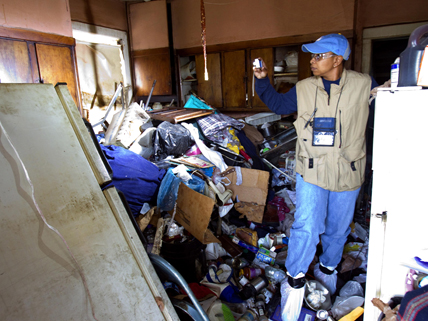A Chicago building inspector examines a home where an elderly couple was found buried, still alive, under mounds of trash.
Perhaps you have seen TV reality shows about people whose homes are jam-packed with possessions, junk, and garbage. Items that range from old newspapers to unfinished craft projects to collections of frog figurines are stacked to the ceiling. Crews hired to clean such homes have even found the carcasses of long-lost pets under the piles of trash. The people who live in these homes are shown to have a mental illness often characterized as hoarding. Hoarding imperils their physical health, their safety, their relationships with family and friends, and even their freedom, as when a local government determines that their property must be vacated or demolished.
Psychologists have commonly linked compulsive hoarding with obsessive-compulsive disorder (OCD), the condition that drives sufferers, for example, to wash their hands dozens of times a day or to open and close a door a certain number of times before walking through. A recent study is changing that view.
Researchers at the Anxiety Disorders Center and Center for Cognitive Behavioral Therapy in Connecticut used functional MRIs to compare the brain activity of hoarders with that of people diagnosed with standard OCD. Both groups were challenged to discard basically useless items that belonged to them along with items that were not their own. The results showed clear differences between the two groups. The hoarders’ brains showed much more activity when deciding what to do with their own possessions. Since the research shows that the two disorders are distinct, it follows that mental health professionals will develop treatment programs to address hoarding that are distinct from those for treating OCD.
Image credit: © Alex Garcia/Chicago Tribune/MCT via Getty Images
Related Links
-
Brain Scans of “Hoarders” Show Unique Abnormalities
This article summarizes the study’s findings.
(Source: HealthDay, August 7, 2012) -
Overview of Hoarding
This website includes much information on hoarding, including resources for people who suffer from the problem; includes a video interview with a hoarder that shows her cluttered home.
(Source: International OCD Foundation; accessed September 30, 2012) -
Compulsive Hoarding
Read about the symptoms and diagnosis cues for hoarding, along with information on hoarding subtypes.
(Source: Wikipedia; accessed September 30, 2012) -
Neural Mechanisms of Decision-Making in Hoarding Disorder
Check out an abstract of the article by Dr. Tolin et al. here. Readers must register to access the entire article.
(Source: Archives of General Psychiatry; accessed September 30, 2012)





sad { (
{ (
Thanks for the reality check. I weigh my urnecessany item against something I KNOW I need. That helps me because I am SO impulsive. I’ll ask myself if my money is used better for the immediate gratification, or going towards the thing I am saving up to purchase.
I hope they get better! 🙂
I haven’t been officially dinsgoaed either, although I can see from a family member who was dinsgoaed with “some components of OCD” that I have some too. My biggest thing is I like to play by the rules, or “by the book.” I’m not completely rigid with it though, but I was known at work as a “by the book” person. Since I was in a profession where not following rules (or guidelines/procedures) could get you dead, this was probably an advantage. My weird quirk is I hate those sticky price labels on books. If I buy a book I take the tag off as soon as I am in the car.
I am fine with it if they are promoting an book that is under cntoract, but I don’t see much point if it’s an unpubbed author. Most agents and editors I know don’t go browsing author’s websites reading excerpts looking for new writers (there are exceptions to every rule). My guideline is keep the excerpt less than 10 pages (because that’s how many pages we allow in a Google books search), and keep it from the first 1/3 of the book (because sometimes I need exclusive excerpts, and it’s hard to keep track otherwise).
but its stil sad right?
(sobbing)SO SAD!!!!!!! 🙁
I have never officially been dnegiosad as having ocd but I have had a psychologist tell me she was pretty sure I had it. Some of my quirks 🙂 are that I have to park in the same place at the store every time go, I eat M&Ms by color that I like the most, I specific spots for things in my fridge and I can almost sense if someone put something away wrong, make tons of notes everyday, and pretty much have an exact way and order to every task I do 🙂 and those are just some. The thing that makes me think I do have it is that it isn’t that I just like things done that way I get upset and feel out of control if they aren’t done that way.